Mihika Rao One Less God
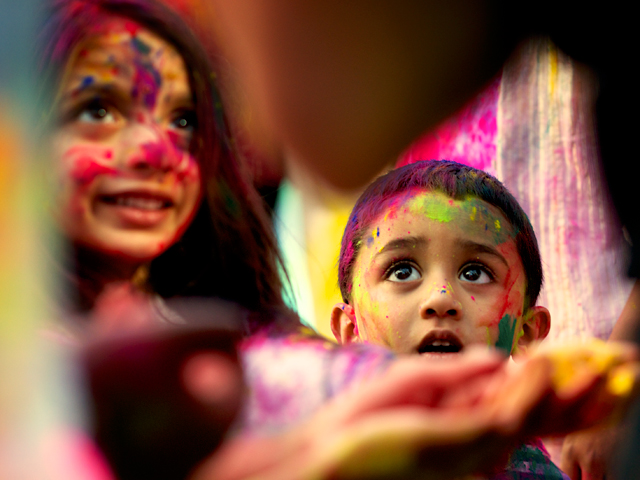
Retelling the Three-Day Siege in Mumbai's Taj Mahal Palace Hotel
Cast: Joseph Mahler Taylor, Sukhraj Deepak, Mihika Rao
Director: Lliam Worthington
Genre: Drama, Thriller
Rated: MA15+
Running Time: 133 minutes
Synopsis: A group of international travelers struggle to survive when Islamic extremists besiege their luxury Indian hotel. Inspired by true events.
One Less God
Release Date: November 1st, 2018
Special Event Screenings:
Sunday 21 October: Q & A Red Carpet, 3.30pm: Event Cinemas, Tuggerah
Tuesday 23 October: Sydney Red Carpet, 6.15pm: Hoyts, Entertainment Quarter
Wednesday 24 October: Q&A, 6.00pm: Event Cinemas, Parramatta
Friday 26 October: Q&A, 7.30pm: Avoca Beach Picture Theatre
Saturday 27 October: Q&A, 8.00pm: Real Film Festival, Newcastle
Monday 29 October: Q&A, 2.00pm: Avoca Beach Picture Theatre
Sunday 18 November: Q&A, 6.30pm, Avoca Beach Picture Theatre
 About The Production
About The Production
Inspired by true events and told from the perspectives of both hostages and terrorists over the course of the devastating three-day siege in Mumbai's Taj Mahal Palace Hotel, the award-winning debut feature by writer/director/producer Lliam Worthington, was named Best Film at the 2017 Byron Bay Film Festival and received both the Grand Jury Prize – Best Feature and the Industry Choice Award at Los Angeles' 2017 Dances with Films Festival - the only feature in the twenty-year history of the festival to receive both honours.
"With 166 people killed, over 600 injured and thousands swept up in the events, November 2008 is India's 9/11," says Lliam Worthington. "We spent years researching and writing, and once we became immersed in the events and the geo-politics, we knew we needed to get beyond the timeline of events that were filling the news cycles. We wanted to get to the heart of the tragedy, and also beyond it - to the people on both ends of the guns."
Powerful and thought provoking, large portions of the film's dialogue was directly inspired by the leaked transcripts of the 2008 siege. Worthington says: "I wanted to craft a story that walks the line between the minefields of demonisation and apologetics, and offer a genuine movement towards greater humanism and compassion. That's a very difficult path to find, but with all that is taking place in the world, it's vital that we find ways to help immunise our societies from those who seek to pull us towards either extreme. I think it's always been one of the duties of the arts, to help us find the road less travelled in our conversations, and I believe that's what we've done and why the responses we're getting from festival audiences are so strong."
Co-producer Nelson Lau said: "Conceived eight years ago and filmed and produced over three years, One Less God is a truly independent feature largely created by sweat equity and grass roots industry support." Producer Maren Smith continued, "This is a feature made by people of many different faiths: Muslim, Hindu, Christian, Jews, Buddhists and those of no faith as well. I think together we have made a deeply humanist film that shrinks from nothing, which we believe is vital right now in this divisive political climate."
The film stars a diverse Australian cast bringing to life the hostages, international guests, the hotel staff and the terrorists, including Joseph Mahler Taylor, Mihika Rao, Kabir Singh, SukhRaj Deepak, Kieran Kumar, Nathan Kaye, Martelle Hammer, Reilly O'Byrne-Inglis, Igor Kreyman, Joseph JU Taylor, Quentin Yung, Nicole Fantl, Jan Langford-Penny, Philip RK John, Nicolas François, Kaliopi Eleni and Rhavin Banda - many of whom will make their screen debuts.
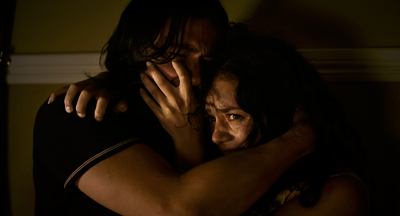 Extract from the Statement from the Medical Examiners in India:
Extract from the Statement from the Medical Examiners in India:
RESULTS: A total of 175 people were killed, 9 were terrorists with 166 victims. Of the 166 mortalities, postmortems were conducted on 114 predominately male victims ages 5 to 70 years old; 108 of these were dead on arrival. Sixty-eight people died from bullet injuries, 30 from blast injuries, and 10 had both bullet and blast injuries. Six were postoperative deaths (all bullet injuries), of which two were early postoperative deaths and four late postoperative deaths due to septicemia.
Bhandarwar AH, et al. J Trauma Acute Care Surg. 2012.
Director's Statement
Perched high in the burning Taj Mahal, the young terrorist was being asked a favour by his handler. There was an ambulance parked on the street below that he could see via his news feed, and he wanted the young operative to go to the window and throw a grenade down upon it so he could watch it explode live on his television.
His request was soft, falsely casual, and it only made his desire the more apparent. This was clearly a man who wanted to heighten his own experience, to feel the extension of his power and see his will enacted. A man who wanted to serve god, or a man who wanted to feel like one?
But to the handler's great annoyance his request was ignored by the young militant. For in tones better suited to a wide eyed Jack freshly returned from his beanstalk, the young operative was too busy trying to describe the opulent world he'd found himself in – so sure that if he could just describe the wonder of his surrounds, the handler would undoubtedly share his awe. The rebuke the young terrorist received landed heavily, as though chastened by a beloved father ... or perhaps more than even a father, for this was a man he believed spoke for God.
It was 2009 when I first heard the intercepted communications between the Lashkar–E– Taiba terrorists and their handlers back in Pakistan. Within the sweeping scale and enormous tragedy of the events, it was the hidden doorway I'd long been seeking. Here were two men that had managed to stop the world, in the midst of one of the most audacious terrorist attacks in history ... with a level of disconnect that bordered on the outright comical.
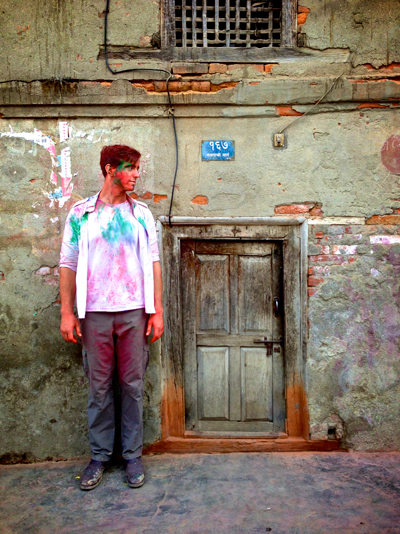 Co-Producer Nelson Lau and I both had friends who lost people close to them in the attacks, so we certainly felt a strong personal connection to the material, but recognised that that in itself does not mean you are going to communicate anything of value.
Co-Producer Nelson Lau and I both had friends who lost people close to them in the attacks, so we certainly felt a strong personal connection to the material, but recognised that that in itself does not mean you are going to communicate anything of value.
I'd spent years researching and writing early drafts, but as I became ever more deeply immersed in the 26/11 attacks and the geo-politics surrounding them, I knew we had to get beyond the timeline of events that were filling the news cycles. I wanted to get to the heart of the tragedy, and beyond it, to the people on both ends of the gun.
Early drafts of the script oscillated between a wide array of survival stories, but they always felt wrong. The number of stories about courage and resilience were vastly overwhelmed by those of pain and loss, and it seemed an emotional betrayal of the true character of the events to frame them as yet one more tale of man's triumph over adversity – with terrorists being the new tidal wave or towering inferno.
I wanted to craft a story that walked the line between demonisation and apologetics, and that would be a genuine movement towards greater humanism and compassion.
One that might aspire to promote healthy discussion afterwards, as opposed to the discourse that takes place in the emotionally charged wake of an actual terrorist attack and rarely achieves anything except to heighten fear and increase the polarisation. This terrain was even more perilous than it was tragic, but there was clearly something important in the darkest corridors of the siege and it was a dimension I felt unlikely to be approached by larger budgeted pictures. The timeline and specifics of 26/11 like with all terrorist attacks had been endlessly covered, and I did not want to make a reenactment film – and that approach seemed better fare for documentaries.
Fortunately the territory I was most interested in seemed to be where for whatever reason, no one else was focused.
I wanted to capture the emotional authenticity of those who suffered in the attacks but counter pose that with a genuine exploration into the psyches of the terrorists. Then use those two conflicting yet parallel journeys as a means to evoke broader questions around man's inhumanity to man and the nature of belief. I feel there is no more relevant time to explore questions surrounding ideas and behaviour than in the middle of a terrorist siege. You're seeing people at the edge, under the most extreme kind of pressure, where character most truly reveals itself.
To this end we dug in hard. The actor's rehearsal process was long and arduous. It was truly harrowing at times. There was a great degree of emotional bravery and sacrifice that I think we all made in truly committing to the material and seeking to honour the tragedy of the events, and I'm very proud of that, as I think it clearly shows on the screen.
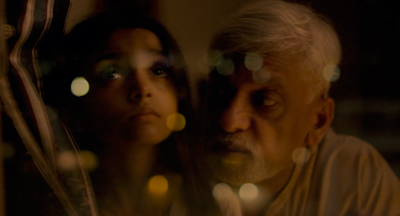 I think if submerging yourself into this material does not leave you feeling battered inside and out, and just wanting to rail at the sky, then there is probably something a bit wrong. And I think there is actually great worth in making people feel that emotional overload, and the subsequent impulse of just wanting to scream at the heavens ... we must be able to do better than this.
I think if submerging yourself into this material does not leave you feeling battered inside and out, and just wanting to rail at the sky, then there is probably something a bit wrong. And I think there is actually great worth in making people feel that emotional overload, and the subsequent impulse of just wanting to scream at the heavens ... we must be able to do better than this.
That was the emotional goal for the film that I worked hard to try and achieve. I think that's tragedy at its best. Only true devastation offers catharsis. And I'm not a great fan of the flat empty feeling so many Indie's seem happy to impart as their exit emotion. Film is an emotional medium, and I want to feel the widest gamut of emotions I can. And I want that emotional tapestry to take the audience to places they may not be expecting.
The lead terrorist character Yaaseen (Kabir Singh) was loosely based on the one surviving terrorist from the Mumbai attacks, Amjal Kasab. Amjal had been picked up by recruiters off the streets of Lahore. He was taken to a camp, indoctrinated, trained and was told "he would be celebrated". That he would be "hailed as a great Muslim hero".
That he was doing "God's work". Afterwards as the sole surviving terrorist, he was tried, hung, and the Muslim community would not grant him burial.
Their position is more than understandable, his actions were not just deeply offensive and non-representative of their practice of Islam – they were gravely damaging. And yet, I think there is inherent tragedy in this also. When you factor in the relationship dynamics with the handler and the indoctrination they all received – while I cannot weep for the men they became, my hope is we still can for the boys they all once were – for only in that do I see the commonality and humanism required to walk any road towards peace.
Kasab's story really caught me. How does a 14 year old boy, once famed for his love of standing in front of a TV shop and acting out movies, end up six years later on the streets of Mumbai firing an AK-47 into a crowd of screaming people? I think the world wants to know that answer and is grappling with it right now.
But the answers are complex, dynamic and function on a spectrum, and as often as not have much more to do with what it means to be human than any inherent psychopathy or extreme religious belief. I think like what many of the best Muslim advocates are saying, that these people are wrong, that this is not Islam, yet still recognise the fundamental problem we face in not being able to control their interpretation. If they believe themselves religiously motivated, then unfortunately at that point they become so. And our opinion that they are wrong is of little or no help. We can't control their minds.
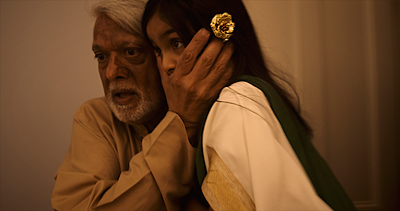 It all just illustrates how important it is that we don't think around these issues in such binary ways, and also why though repugnant to some, I felt it was deeply important for the audience to also feel – even if unwanted – a human connection with the terrorists and glimpse the healthy internal conflict that hopefully creates. There are many ways we strove to achieve this; from predominantly using soft–light whenever we lit them, to the fact we do not connect their faces with any of the initial shootings and killings, so that the first time you see a close up of Yaaseen, you are not looking into the eyes of a monster, but of another human being.
It all just illustrates how important it is that we don't think around these issues in such binary ways, and also why though repugnant to some, I felt it was deeply important for the audience to also feel – even if unwanted – a human connection with the terrorists and glimpse the healthy internal conflict that hopefully creates. There are many ways we strove to achieve this; from predominantly using soft–light whenever we lit them, to the fact we do not connect their faces with any of the initial shootings and killings, so that the first time you see a close up of Yaaseen, you are not looking into the eyes of a monster, but of another human being.
The reality we face now is that we live in a time where terrorist attacks are increasing, this is turbo charging the popularity of xenophobic nationalist parties, social media enflames everything, the political divide widens, bigotry rises, people are increasingly victimised and feel aggrieved ... this symbiosis between the extremes feeding each other is very disturbing. It's a scenario where only extremist recruiters from both sides truly prosper.
This being the case it is critical for those of us in the western world to understand that Muslims are the ones who suffer first and foremost at the hands of Islamic terrorists – as it demonstrates that there are deep fissure lines in the Islamic world, and that this is not at all about Muslims as any monolithic block or cohesive whole.
So as important as it was to make a film that does not shy from the issues surrounding religious extremism or the atrocities committed by the terrorists, it was equally important that our terrorists not be dehumanised or were also the sole representation of Muslims in the film. And so in Eda (Reilly O'Byrne-Inglis) we sought to craft a Muslim character that we felt truly exemplified the very best traits of her faith, or indeed any faith, as well as that of broader humanism.
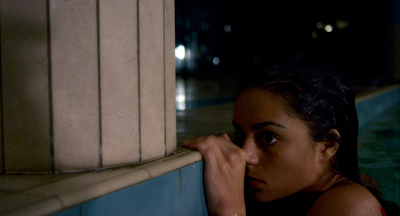 This film was made by people of many different faiths: Muslim, Hindu, Christian, Jews, Buddhists and those of no faith as well. I think together we have made a deeply humanist film that also shrinks from nothing, and that that is vital right now in this divisive political climate.
This film was made by people of many different faiths: Muslim, Hindu, Christian, Jews, Buddhists and those of no faith as well. I think together we have made a deeply humanist film that also shrinks from nothing, and that that is vital right now in this divisive political climate.
Ultimately though, everyone will decide for themselves what One Less God means to them, but for my part, that's what I would like One Less God to be about. Not terrorism, tragedy and pain, and certainly not inciting further xenophobia, but instead asking in the light of such continued suffering, is there truly anything more important than finding the courage to let go of the things that separate us from love ...
Lliam Worthington
Writer, Producer & Director
MORE



